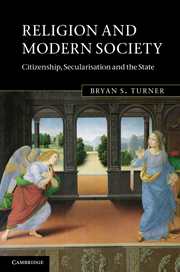Book contents
- Frontmatter
- Contents
- Acknowledgements
- Introduction: the state of the sociology of religion
- Part I Theoretical frameworks: the problem of religion in sociology
- Part II Religion, state and post-secularity
- 7 The secularisation thesis
- 8 Legal pluralism, religion and multiculturalism
- 9 Managing religions: liberal and authoritarian states
- 10 Religious speech: on ineffable communication
- 11 Spiritualities: the media, feminism and consumerism
- 12 Religion, globalisation and cosmopolitanism
- 13 Civil religion, citizenship and the business cycle
- 14 The globalisation of piety
- References
- Index
8 - Legal pluralism, religion and multiculturalism
Published online by Cambridge University Press: 05 June 2012
- Frontmatter
- Contents
- Acknowledgements
- Introduction: the state of the sociology of religion
- Part I Theoretical frameworks: the problem of religion in sociology
- Part II Religion, state and post-secularity
- 7 The secularisation thesis
- 8 Legal pluralism, religion and multiculturalism
- 9 Managing religions: liberal and authoritarian states
- 10 Religious speech: on ineffable communication
- 11 Spiritualities: the media, feminism and consumerism
- 12 Religion, globalisation and cosmopolitanism
- 13 Civil religion, citizenship and the business cycle
- 14 The globalisation of piety
- References
- Index
Summary
Introduction: in principle and in practice
Islamic holy law (the Shari'a), along with the veil, has become one of the most contested issues in Western liberal societies. The possible introduction of the Shari'a raises significant problems for multicultural policies as a specific example of legal pluralism. In this chapter I briefly outline four positions one might take towards the recognition of Shari'a law in any secular state with a diverse multicultural society. The first option would be to take up some normative in-principle position either to accept or to reject the Shari'a. This would involve public debate about religious law in a secular state along the lines suggested in Jürgen Habermas's recent comments on a post-secular society (Habermas, 2002; Habermas and Ratzinger, 2006). The second option would be to follow a pragmatist strategy either for or against. This approach might equally accept or reject Shari'a, but in this case the reasons are practical and not normative. A government might decide to accept or reject the introduction of religious courts depending on the possibility of their integrative or disruptive social consequences. The pragmatist approach suggests that a government might just see what happens (partly from historical experience and partly from contemporary observation) when there is some piecemeal recognition or introduction of legal pluralism. If this piecemeal departure from legal uniformity does not cause too much public uproar, a government might feel comfortable with some slow evolutionary departure from state sovereignty, legal uniformity and secularism.
- Type
- Chapter
- Information
- Religion and Modern SocietyCitizenship, Secularisation and the State, pp. 151 - 174Publisher: Cambridge University PressPrint publication year: 2011



